Apples are widespread throughout the world and are famous for their juiciness, as well as for their nutritional value. They can be eaten fresh, in pies, turned to gelatin, juices, jams and many other wonderful products. Apples are rich in flavonoids, which help reduce the risk of cancer. Let us take a look at some of the nutritional facts about apples.
The apple - the meaty fruit with a hard crust coming in yellow, green, to dark red colors is a fruit of the apple tree. In Greek mythology, apples are related to Asclepius - the God of healing. This may have led to the origin of the popular phrase, "an apple a day keeps the doctor away". During the Middle Ages, healers discovered that problems in the intestines, lungs and nervous system could be relieved by consuming cooked apples. Thanks to their beneficial effects on digestion, Apples are served after meals by tradition.
Nutritional value of apples
Apples are loved throughout the world for their juicy and sweet taste, as well as for their nutritional value. Even though we know they are nutritious, many of us may wonder how exactly they are beneficial and to what extent they can be used in the prevention of diseases. Finding out the facts about their nutritional values will help us understand why they must be a regular part of our diet.
Nutritional values per 3.5 oz (100 g):
Water - 87.23 g

Protein - 0.70 g
Carbohydrates - 11.42 g
Sugars (total) - 9.92 g
Fat (total lipids) - 0.28 g
Calcium - 6 mg
Magnesium - 7 mg
Iron - 0.17 mg
Phosphorus - 16 mg
Potassium - 157 mg
Vitamin C (total ascorbic acid) - 9.5 mg
Vitamin E - 0.26 mg
Folic Acid (total) - 5 mcg
Vitamin K6 - 4 mcg
Dietary fiber (total) - 1.4 g

Nutritional benefits of apples
Apples need to be eaten along with the skin, since it contains many important elements. However, do not forget to wash the apple well before eating. The different nutritional and health benefits are:
Apples against cancer
Apples are rich in flavonoids, which help prevent the development of cancer cells in prostate cancer. Further, the phytochemicals found in the skin of the apple prevent the multiplication of cancer cells in the large intestine.
In a study carried out in Strasbourg, it was discovered that the consumption of apples reduced the risk of colon cancer. This is because whenever an apple fiber remains in the colon for a period of time, it begins to produce chemicals, which combat cancer cells.
The researchers also discovered that apples help prevent the development of liver cancer. So remember - never peel apples because the skin is an important part, which needs to be eaten.
Apples against Alzheimer's
Since apple skins also contain quercetin, it is believed that they are very useful in the battle against Alzheimer's.
Apples against hypertension, cholesterol and stroke

Adults that eat 1 apple a day have a 37% less chance of getting hypertension than others. Further, they are also less likely to have a stroke and high blood pressure. Apples contain soluble fibers, such as pectin, which help to prevent the accumulation of plaque on artery walls and therefore decrease the risk of atherosclerosis and heart diseases. Consuming 2 apples per day decreases cholesterol levels.
Apples for good digestion
They improve intestinal function. Pectin and other acids found in apples aid digestion, which is why apples are served after heavy meals. The insoluble fibers in apples retain water in the digestive tract, which helps to cleanse the intestines and for the food to pass more quickly through them.
Besides the aforementioned health benefits, apples also contain calcium, which is key for healthy bones and teeth. Research shows that people who ate 5 apples per week were less likely to be affected by asthma. Apples even aid in weight loss - eating 3 apples daily will help for quicker weight loss. The reason is, when you eat apples, they satisfy hunger and you eat less of other foods.
There are hundreds of varieties of apples available in supermarkets. They are not expensive and are extremely beneficial. So there is no reason for you not to eat this healthy fruit!

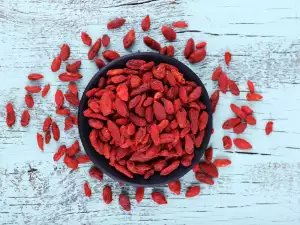




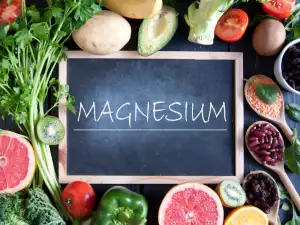
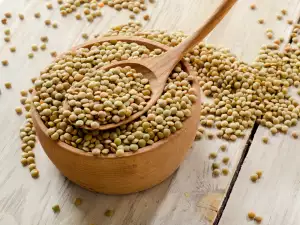



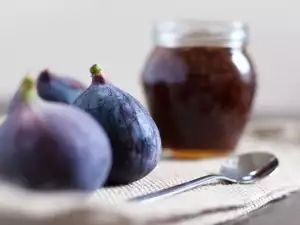
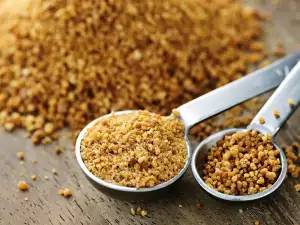
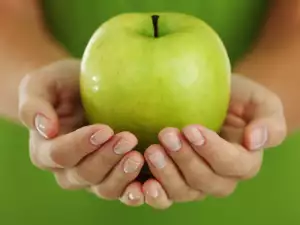






Comments